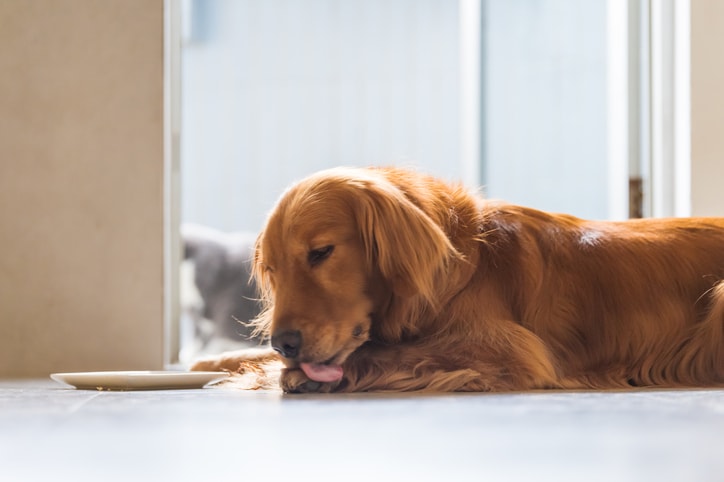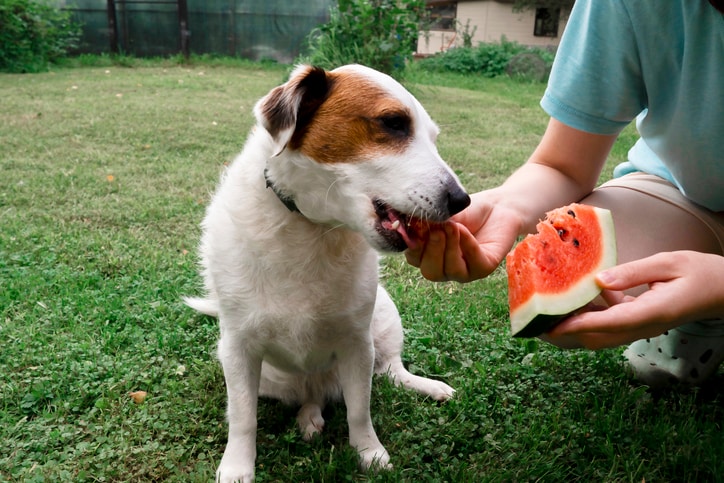You and your dog come in from your nightly walk. You settle in with a cup of tea. Then, from the doggie bed, you hear those lick, lick, chew, chew sounds, which are becoming a bit of a nuisance. When does your dog licking paws warrant a trip to the vet?
“If the licking is continual, the paws are swelling or developing sores, or their feet are getting a rusty color,” then it’s time to see the vet, says Dr. Amy Tate, a veterinarian and co-owner of Riverview Animal Clinic in Birmingham, Alabama. “It can progress rather quickly and become a very painful condition for your dog, so it’s important to keep an eye on.” Check your dog’s paws, and start noting when and how often they’re licking them.
“Before you look at the behavior aspects of the licking, there are a few medical issues you need to rule out first,” says Dr. Gary Landsberg, a veterinarian and veterinary behaviorist at the North Toronto Veterinary Behaviour Specialty Clinic, a past president of the American College of Veterinary Behaviorists and a co-author of “Behavior Problems of the Dog and Cat.”
Here are five reasons for a dog licking paws, along with tips for how to address the situation:
1. Seasonal allergies
“The primary reason why pets will lick their paws is some sort of underlying allergy,” says Tate. You’ll know it’s probably a seasonal allergy, say both experts, because the licking will start and end at the same time every year and is from contact with some kind of outside element. “Dogs that lick their feet a lot coming in from a walk might have a grass allergy,” says Tate. Pay attention to when the licking occurs and try to clean the feet when they come in, she advises, adding, “Don’t put socks on to try to protect their paws. And don’t clean with anything irritating, like hand sanitizer. Keep them dry.”
2. Food allergies
Both experts say if licking is accompanied by other itchy patches on their dog’s skin or ear problems, this could mean a food allergy. “Food allergies also cause facial and feet itchiness,” says Tate. “Sometimes changing the diet is what stops this behavior. If it’s ongoing, then it’s probably food allergies.” To solve the problem, Tate notes that the first thing to take away would be proteins, such as beef and chicken. Lamb and rice are easily accessible as alternatives, she says. You can also add a fatty acid supplement, which can be found in some foods already, or get them over-the-counter.
3. Yeast or bacterial infection
If there is an odor coming from your dog’s paws, it could be an infection. “There are many types of infections that could be present,” says Landsberg. ” A vet can tell what kind of infection it is by the odor, by looking at the area and by testing little smears under the microscope.” Do get your dog tested for infections if the licking and biting of his paws has a strong odor with it. Don’t try to groom away the smell right before you take him to the vet, he advises, as you might wash away important skin clues that the vet will need to test to determine the type of infection.
4. Skin diseases
Skin diseases might be another cause of dogs licking paws. “Scratching his ears, debris in his ears or other parts of the skin, licking, rawness — any of these could indicate different types of skin diseases or internal problems,” says Landsberg. Do look for any other skin lesions or hot spots on your dog and tell your vet. Don’t use any harsh soaps, including flea baths, if you suspect your dog has an underlying skin disease.
5. Behavioral causes
“Pets should only lick at their feet for cleaning or grooming themselves,” says Landsberg. “Any more than that is abnormal.” While your dog obsessively licking one spot could be behavioral, Landsberg says, “do rule out any medical causes first before you suspect behavioral issues.” Don’t assume it’s only a behavioral issue.
Landsberg also cautions that dogs licking paws could also be due to parasites, or less commonly, to immune diseases, so it’s vital to know your dog’s history. Your vet can do a thorough examination to determine an exact cause and get you started on the best possible treatment.
Amy Aitman is a freelance writer who loves writing about things that matter to her — like her Westie Buckles, who is a definite paw licker, especially when allergy season hits.


